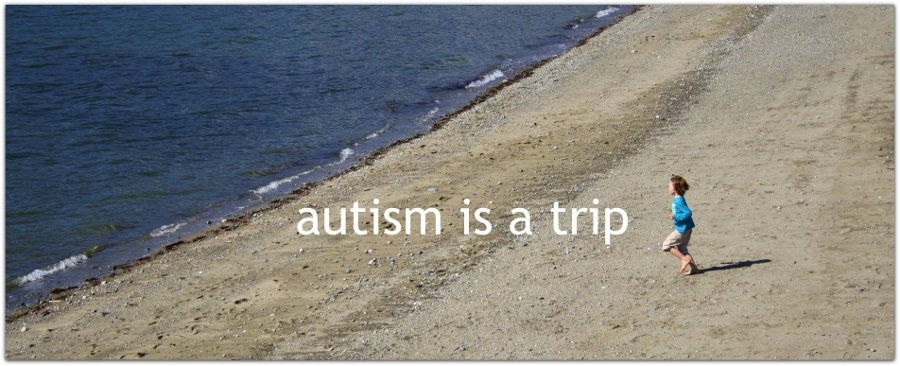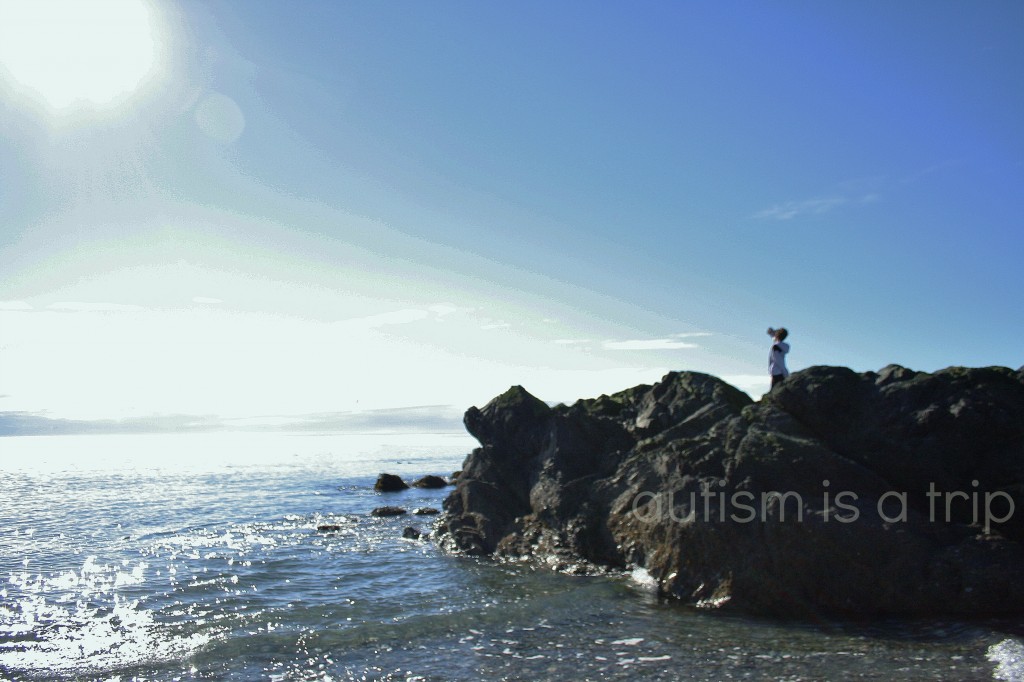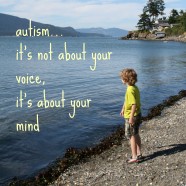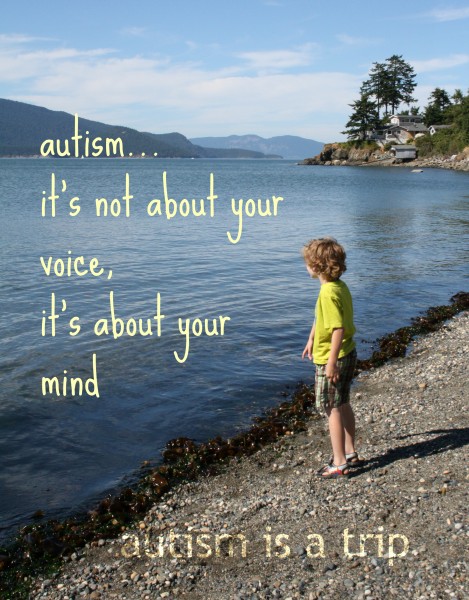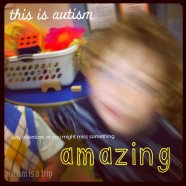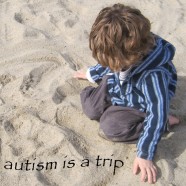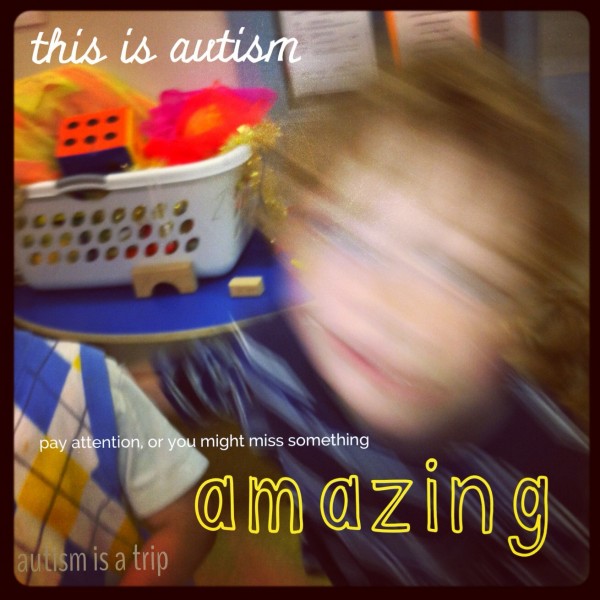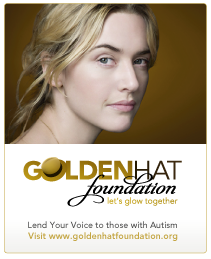A Tragedy in BC – Failing The Caregivers
Autism Awareness (ought to be Acceptance) Month is winding down, and unlike April, it will not go out like a lamb. The lion of autism injustice is still roaring, louder than ever.
While people are walking and gathering and fundraising and celebrating the wonders and gifts of autism (which I wholeheartedly support), the dark underbelly is growing. It’s time for us to face it.
Death has become altogether too common in the autism community. Every week or so there’s another story about an individual who has bolted or wandered and not made it home. And every month or so, an autistic individual is harmed or murdered by a caregiver.
The tragedies are too numerous to count, and happening much too often. They are also hitting closer to home – both in proximity and emotion.
Our children are in danger.
Issy Stapleton. Alex Spourdalakis. And now, Robert Robinson.
Last week, British Columbia resident Angie Robinson murdered her 16-year-old autistic son, then took her own life.
It’s easy to automatically blame Angie. How could a mother possibly take the life of her own child? What kind of parent does that?
A desperate parent. A parent who has reached the end of their resources, both physically and mentally. A parent who believes they have absolutely no other answer.
Nobody thinks they could ever get to the point where suicide and murder are a viable option. We all assume if things get dark enough, someone will appear with a light.
No parent, even a parent of a profoundly disabled or autistic child, wants death (I’m assuming the best, of course). Even at the very end of the rope, we are still hanging on, holding out for a glimpse of hope.
But occasionally, the darkness consumes everything, and no light can get through. There is no hope. Or, at least, that’s what a desperate parent believes.
Yes, the violent acts visited on children by their own parents and caregivers is atrocious and unimaginable. No child should ever fear for his or her life in their own home. I am not suggesting that what Kelly or Angie or Alex’s grandmother did are acceptable in any way.
But I do understand them. And I can understand how things could get so desperate for them that they felt they only had one solution.
It all comes down to support. The proverbial village. The village that supports the child needs to support the caregivers and parents, too, and therein lies the rub.
Autism supports vary from country to country, province to provice. There is no standard of practice or care even within a the US or Canada. Children and individuals with autism often need intense, one on one care, either in the home or a residential facility. Not every family is equipped to handle these situations, yet there is often little in the way of respite and support for them.
As far as I can tell, support for caregivers is pretty much nonexistent. If a family member requires placement or full-time care and none is available, what is the caregiver to do? Between a lack of professional support and the overwhelming costs of respite and residential care, it should really be no surprise that parents are losing hope.
There are two victims in these crimes. Two lives lost. Two stories that didn’t have to end this way.
When a desperate parent decides to kill their child and themselves as a way out, the entire autism community has failed.
We have failed the child by not giving them everything they need to live a happy life to best of their ability.
We have also failed the caregiver by not recognizing that a healthy caregiver is essential to a healthy, happy autistic individual.
We cannot expect autistics and their families to survive and thrive if they are constantly at war just to get support.
Any one of us could reach the limit. Or anyone we’ve met. Nobody knows just how much someone can take, and what will be their breaking point. We need wholesale change in the way we support autistic individuals and their caregivers. The reality is if the caregiver is too stressed and is getting no help or relief, the whole family is in potential danger. These horrible stories will continue until something big changes.
Caregivers need to be heard and helped when they reach out. By the time a parent reaches the point of murder and suicide, it’s too late. Families need care and support from the very beginning, not just when things get rough.
Until then, keep your ears and shoulders available for your friends, in real life and on the internet (which is oftentimes who need it the most). Be a friend, be aware of what’s happening. Also, don’t hide your situation from the world. Open up to anyone you think will take you seriously.
And let your local government know how you feel about caregiver support and the lack thereof. Be loud, and be heard.
If the system can’t/won’t help us, we have to help ourselves.
Share this: Twitter | StumbleUpon | Facebook | digg | reddit | eMail Read MoreExtreme Air Park – Hostility, Greed, and Autism
We in the autism community are, sadly, used to hearing about maligned special needs parents and children. It’s become an all-too-common topic in the news and blogs lately. While most of us know or are familiar with some affected persons, it’s rare (at least for me) to have a situation happen right in your own backyard.
Or down the street, in my case.
We live in Langley, British Columbia, just South of Vancouver. From what I’ve experienced in the almost four years we’ve lived here, it’s a really nice community. The people are kind, the schools are good, and children are welcomed almost everywhere. We have parks and playgrounds and activities for families on almost every corner. It’s not Utopia, but it’s a great place to raise a family.
As a child with autism, Jack is welcome with all other children. He has not been excluded from anything he has wanted to do, to our knowledge. He is gaining independence, but he does need accompaniment of his SEA for school activities, and a parent or caregiver for much of everything else.
Kelly Moonie and her son Kyle live in our community. Kyle, like Jack, has autism. I don’t know the Moonie family personally, but I hope their experiences here in Langley have been similar to ours. Most of them, that is.
Recently, Kelly took her son to the Extreme Air Park location here in Langley, an indoor gym of sorts featuring wall-to-wall (and up the wall) trampolines. We’ve been there ourselves, and can attest that it’s a lot of fun. For everyone. We even have a t-shirt.
Kyle was accompanied to EAP with his caregiver, who is charged with assisting him and ensuring his safety. Kellie was told she needed to pay the full price for the caregiver to enter.
Businesses that cater to children often admit a caregiver for free, or at least at a reduced price. Here in Canada, we have a program called Access 2 Entertainment, that addresses the issue directly.
From their website:
Launched in December of 2004, the Access 2 Entertainment program seeks to offer more opportunities for people with disabilities to participate in recreational activities with an attendant, without added financial burden. It is also designed to raise awareness and help businesses provide quality customer service to customers with disabilities.
It is vitally important that special needs children enjoy as much of a “normal” life as possible, and allowing caregivers to accompany them is a major part of that.
After their visit, Kellie sent an email to EAP, explaining this issue, and suggesting they change their policies. She received an email in return, assuring her there would be no such change.
Kellie answered the email, pressing them further on the issue.
The response she got was much less polite, and much more hostile.
From the CBC article telling their story:
“Our system is computerized. I am not lying to you. We know how many people are on the floor at any given time. But what would you know. C U next Tuesday,” replied (Michael Marti, on behalf of ) Extreme Air Park.
Yes, you read that right. C U next Tuesday.
With apologies for the vulgarity, C-U-N-T.
I don’t even know where to begin with this. Calling your customers names is never good business, but in the case of a special needs parent trying to enlighten you on a very important issue?
Firestorm.
Extreme Air Park is a bouncing wonderland, almost made for autistic kids. Maybe that’s the problem. They don’t want autistics. Perhaps I’m wrong, but that’s definitely the message they’re sending. By inhibiting equal access, the Extreme Air Parks are making it very clear that they don’t care for special needs individuals in their establishments. And if those persons wish to patronize the place anyway, they’ll pay for the privilege.
Charging a caregiver full price when they are only there to facilitate the individual who needs them – similar to a seeing-eye dog, if you will – is just plain greedy.
Special needs parents and autistics have enough struggles and obstacles in life already without ignorant businesses piling on.
Even if you do not have a special needs child, the way the company handled this is outrageous and beyond the pale. True, it may have simply been an unprofessional employee taking matters into their own hands, but when you’re speaking for an entire company, you should know better. I have no doubt that any parent attempting to communicate with EAP would have met with similar hostility and derision.
I could go on and on and rant and rave, but I won’t.
Instead, I’ll let you do it. Please.
Please take a moment to tell Extreme Air Parks how you feel about their policies, and the way they treated Kelly Moonie.
Below are the contact numbers for all of the Extreme Air Parks in Canada:
Richmond 604-244-5867
Langley 604-888-8616
Calgary 403-265-2733
Edmonton 780-479-7790
They are also on Twitter: @Extreme_AirPark
It would appear they’ve deactivated their Facebook account, but you can send them an email directly on their website here.
On behalf of Kelly and Kyle, Jack, the children of Langley, and special needs families everywhere, I urge you to take a stand.
I am.
But first, I’m going to go throw away that t-shirt.
Share this: Twitter | StumbleUpon | Facebook | digg | reddit | eMail Read MoreAutism: Don’t Ask, Don’t Tell?
I am very fortunate to have a vocal readership. I receive a lot of comments, messages, and emails via my Facebook page, here, and on redOrbit. Some are of the “me, too!” variety, many are requesting advice, others are autism parents reaching out to an understanding ear.
Then there are the rest. The criticisms, the angry voices opposed to what I’m saying, the ones I’m just not sure about. The ones that make me shake my head and say “wtf?”
Yes, I actually say “wtf.” Clearly, I’m a fourteen-year-old girl trapped in this forty-something brain.
Normally I shrug them off. Occasionally I address them, when I feel like the writer is completely out of line or misconstrued my intent. More often I simply thank them for taking the time to read my work. It’s always nice to be read, whether or not it’s appreciated.
This week I received an email, in response to this post, that not only got my attention, it really got my ire up. Instead of merely ignoring or answering the email, I thought it would be better played out here, where I can share it with a wider audience. I honestly believe this is a subject that should be talked about.
Loudly.
Here is the email I received:
Dear Wendy,
I am assuming your story ‘Dear Son, You Have Autism‘ is real.
I believe you should not label your son as autistic, definitely do not tell him about. He looks to me, based on your story, as quite normal.
Our understanding of psychology and the underlying chemistry is yet in the infancy.
We are ignoring the negative effects which the ‘modern ‘labelling’ may have on self esteem and confidence of children and young people. I am in fact terrified seeing how easily Educators and Psychologists (in fact ignorant in Chemistry, Biology, Medicine and many other relevant Sciences) are labelling our kids with the whole spectrum of disorders.
This also happened almost 40 years ago to my son, labelled (sic) as hypersensitive, almost abnormal – the label ‘autistic’ has (sic) not been yet in use.
He finished his tertiary education brilliantly, and is since years an IT expert co-working with a team of researchers on mysteries of our brain.
SXXXXX
ps. I worked my whole life as an academic, educator and researcher and remain very critical of many of the modern classification – labelling (sic) methodologies. In particular terrifying is that these people are ignoring huge probability of being wrong.
So many things to say here. Where should I begin? I think I’ll go through it line by line.
I am assuming your story ‘Dear Son, You Have Autism’ is real.
If you had taken the time to look at my website, you’d see that yes, in fact, our story is indeed true. I don’t write fiction.
I believe you should not label your son as autistic, definitely do not tell him about. He looks to me, based on your story, as quite normal.
Tell me, how, exactly, does an autistic individual look? I’m guessing you don’t look ignorant, yet here we are.
What’s in a label? You call yourself an “academic,” and that’s a label. Some labels are pretty awesome. “Nobel Prize Winner.” “President.” “Canadian.” Why not call a spade a spade?
The larger issue here is the statement that my son looks, to you, “quite normal.” What, pray tell, is “normal?” Should I tell my son that since he can “pass” as normal, that he ought to? That he must hide his true identity, like the Jews in WWII, light-skinned blacks in the 1950’s and 1960’s and gay teenagers today?
That opinion puts you in pretty bad company. To insist that my child pretend he is something that he is not for your comfort or your ignorance or his safety makes you no better than the Klan in my book.
Harsh words, yes, but so is telling me to hide my child’s true self.
I have no more intention of keeping Jack’s autism from him than I have of keeping his place of birth or Scottish ancestory a secret.
Jack was born in Indianapolis. He is a direct descendent of William Wallace. And he has autism.
To say that my son should hide his autism like something to be ashamed of is absurd, ignorant, and discriminatory.
And I will not do it.
Our understanding of psychology and the underlying chemistry is yet in the infancy.
We are ignoring the negative effects which the ‘modern ‘labelling’ (sic) may have on self esteem and confidence of children and young people. I am in fact terrified seeing how easily Educators and Psychologists (in fact ignorant in Chemistry, Biology, Medicine and many other relevant Sciences) are labelling (sic) our kids with the whole spectrum of disorders.
This is true. It would also appear that you do not have a firm grasp on it yourself, or you would understand that a neurological variance such as autism is not something to be “terrified” of. Your statement that telling autistics that they are, in fact, autistic, will crush their self esteem and confidence is the exact reason we should. The opinion that someone with a difference should think of themselves as “less than” is antiquated at the very least.
What is that telling my son? That he should be ashamed of who he is? That he should wonder for the rest of his life why he doesn’t seem to think the same way as his peers? Why, when telling him the truth will set him free of wonder and worry?
I want my son, and all people with autism, to be proud of themselves. To be confident. To know that there are people out there, like yourself, who fear what they do not know and understand. Autistic individuals face enough difficulty and hardships in their daily lives, they shouldn’t have to add shame and fear to the mix.
We have evolved as a people. We are better than that.
This also happened almost 40 years ago to my son, labelled (sic) as hypersensitive, almost abnormal – the label ‘autistic’ has not been yet in use.
He finished his tertiary education brilliantly, and is since years an IT expert co-working with a team of researchers on mysteries of our brain.
At this point I would like to point out that you appear to have autism and ADHD/ADD conflated. Autism as a term has been around since the early 1900’s, and ADHD/ADD are not spectrum disorders. I am around the same age as your son, and I, too, was diagnosed (not “labeled”) with hyperkinesis, or being “hypersensitive” as a young child. I am not ashamed of it, nor do I believe it was an incorrect diagnosis.
You also seem to be assuming that we have not had our child assessed and diagnosed with professionals who know anything about biology, chemistry, medicine or neuroscience. You claim to be an academic, yet how much of these do you know? My child has been seen and assessed my no less than twenty professionals, including specialists in brain function, speech and early speech acquisition, sensory processing disorders (including fine and gross motor function), psychiatry, and numerous other disciplines.
They all agree: my child is incredibly intelligent, and definitely autistic.
I am pleased that your son finished his education brilliantly, yet saddened by the sense that you feel the need to justify him. He did not accomplish what he’s done in spite of who he is. He has triumphed because of who he is.
And that, my friend, is no less than what I want for my son.
So, I end this on a lighter note than when I began. I beseech you to keep your mind open to differences, and understand that children like mine may very well be the future.
Certainly, hiding in shadows and telling lies is no way to live anymore. History has told that story time and again.
I will leave you with the statement my son Jack has about having autism. This is his story, after all.
“Autism is not about your voice. It’s about your mind.”
And that’s all we have to say about that.
A version of this post originally appeared on redOrbit blogs.
Share this: Twitter | StumbleUpon | Facebook | digg | reddit | eMail Read MoreGuess What? I Have Autism!
“Hi! I’m Jack. I have autism.”
A sentence I wasn’t sure I was ready to hear. Yet, so pleased to see it exclaimed loudly and proudly.
Two weeks ago my husband David and I told Jack he has autism for the very first time. We’ve never hidden anything from him, we just wanted to wait until we were certain he’d be able to understand the gravity of it all to address it directly.
We discussed it for months in advance, tried to plan out what we wanted to say. And what we didn’t want to say. We decided to wait until the summer, so he would have time to adjust to his new reality unfettered by school stresses. We looked at books, we asked what others had told their children.
Summer came and we still waited. For the right time, the right place, the right… whatever. We finally decided to take him out to lunch alone, where we could have a conversation without his brothers drawing focus. It would be perfect.
And we all know the best laid plans always go according to, well, plan.
The days passed and still no discussion, no lunch date. Then one day we were all sitting around the kitchen table doing arts and crafts and what-have-you. I looked at David, he looked at me and shrugged. It just seemed like a good time.
“Jack, do you know what autism is?”
He wasn’t sure, so we expanded on some things he already knew: people have different likes and dislikes, people don’t all look the same, people think differently.
That’s been a recurring theme in our family for years. Whenever one of the children asks why someone is a certain way, or why somebody likes something they don’t, or any time something is not the same as what they know, we say it.
“People’s lives are different.”
We knew someday Jack (or his brothers) would realize that he’s not like most of the other kids, and we wanted him to know that different is not wrong. It’s not strange. It’s not weird or funny or less than. Different is just different.
We described the spectrum, and how all people who have autism fit somewhere on it, but are not the same. That even within the autism community there are differences, and that’s OK.
We told him that autism is why sometimes sounds are too loud and lights are too bright and the Titan AE theme song drives him nuts (although to be fair, it’s really annoying). Autism is why he has a helper at school, and why he needs to run around in the halls periodically. It’s why he takes melatonin to sleep at night.
It’s also why he wants to know everything about every subject that interests him, and wants to share it all with anyone within earshot. It’s not why he’s curious, but it’s probably why he’s curiouser.
So when we said the words “you have autism” to Jack, and explained what we meant, he wasn’t upset. He wasn’t scared or troubled in any way. He was quite the opposite.
I’m pretty certain Jack believes he has some sort of super powers.
Which, of course, he does. Duh.
So, without further ado, Jack’s thoughts on autism.
On the concept of a spectrum, and where he falls on it (we told him he started in the middle, and now he’s toward the high-functioning end):
“It’s hard to read if you’re in the middle of the spectrum. You just have to show your parents the words.”
“If you’re way past schedule on learning, nothing will stop you from learning again and again and again to get to the other end of the spectrum.”
Jack does understand that not everyone can move from one end to the other, although his main concern about those individuals is that they may not be able to have sex properly to have children. He’s quite interested in the mechanics of having babies at the moment.
I’m certain he’ll have more to say on the non-sex aspect at a later date.
On the fact that he was born prematurely, and how that may have contributed to his autism (his correlation, not ours):
“If you’re early (premature) you have a lot more time to learn. If you’re past schedule (post-dates, like his brothers), you don’t have as much time to learn.”
So, according to Jack, he’s got one up on his brothers because he was born six weeks premature.
On early intervention (he started services when he was 23 months old), and the important role parents have in the therapy process:
“You (parents) helped me learn. You also brought someone else over to help teach me to learn.”
“It’s all because of my parents that other people came and taught me. So parents do help out with learning, not just school and other classes. Mostly parents. But mostly school.”
Um, thanks?
“And you learn mostly everything at university.”
OK then.
Some random thoughts on autism:
“I couldn’t walk when I was born, and it’s because of the spectrum.”
Hm, probably not the case.
“I know how to read, so I’m really good at autism.”
I guess so?
We finished up by asking him how he felt now that he knows about autism. Turns out, he thinks it’s pretty cool.
“I think that having autism is great. Of course, what do you know?”
Not much, apparently.
“Do you like autism a lot?”
Yes, yes I do, in fact.
“Well, thank you!”
You’re quite welcome, little man, it’s been my pleasure.
When his aunt and cousins came over later in the day, he ran up to them and gleefully exclaimed, “guess what?!? I have autism!”
Let the celebrations begin.
And, as is his wont, Jack summed up autism in the most eloquent way possible. From the mouths of babes and all, words of wisdom:
“I think it (autism) helps me want to do lots of things. It’s great for the mind, because it can help you do lots of things.”
And finally:
“Some people (with autism) can’t talk – it’s not about your voice, it’s about your mind.”
I couldn’t have said it better myself.
***********************************************************
Next up in this series – what Jack’s brothers have to say about autism.
Share this: Twitter | StumbleUpon | Facebook | digg | reddit | eMail Read More
Dear Jack… You Have Autism.
Dear Jack,
There is something your Daddy and I have wanted to tell you for a long time. Something that we weren’t sure how to bring up, or when. Something that has the potential to change the way you live your life.
Jack, you have autism.
You are my firstborn son, my love, my everything. I have adored you since long before I knew you. I waited to meet you my entire life, and when I met your Daddy, he was just as excited. We knew from the very first time we saw you on the ultrasound monitor that your name would be Jack. We didn’t even think twice, we just knew immediately, right there and then. Jack.
You know that you came into this world a bit early, earlier than your brothers. I spent a long time in the hospital waiting for you, waiting for the day it would be ok for you to come earthside. You were early, but very healthy. Daddy and I held you and couldn’t believe how beautiful you were. You are. Perfect little nose, perfect blonde hair, perfect little fingers and toes.
Perfect.
You came home and made us a family. You are the first, the oldest. Your three younger brothers love you, learn from you, and adore you.
We have known you have autism since you were three years old. Actually, that’s when the doctors told us officially. We’ve known you were special since before you turned two. You couldn’t speak, but you knew things. You were incredibly smart. I have no doubt you understood everything.
Knowing you have autism didn’t really change a lot for us. If anything, it made everything easier. You were able to get the support you needed, and some amazing people came into our lives because of it. Miss Amanda helped you learn how to talk and play. Aki and Jane helped you learn how to climb and swing and do small puzzles. Miss Amelia, Miss Deborah, Miss Shelby and Miss Jesse gently guided you into school, with lots of love and joy for learning. And Miss Shirin, who made sure that someone was always at your side (Eric, Charlie, Geoff, and Christine), teaching you how to cope when things get to be too much, how to focus your attention when necessary, how to be safe, and how to explore and enjoy the world around you with freedom.
They all gave you what every child wants and needs. Freedom.
When we moved to Canada, you started “real” school. Kindergarten. Grade One. Grade Two. This fall you’ll be going into Grade Three, which I can barely believe. Not only are you thriving educationally, you’re speaking French while you do it. Even more amazing people have guided you to this point: Mme Riel, Mme MacIntyre, Mme Dowes, and Mme Okeyere have taught you as they taught every other child in their classes, and gave you every respect and inspiration you deserve. Mr. Yaniv and Mr. Perk have guided you from behind the scenes, putting you on the right path and making certain everyone charged with your care is trained properly and know how to support you in the best way possible. And Mme W in Kindergarten, and Mme S ever since, have been by your side every single day.
Because of this team of professionals, this group of people who both want you to succeed and love you dearly, you are the boy who stands before me today. Jacktor The Tractor. JackJack. Jack.
A child who once could not speak at all, who now can not only speak English on a high school level, but can speak French as well.
A child who had such low upper body tone as a toddler that he could barely climb a play structure, who has now mastered not only the monkey bars, but also taught himself how to ride a bicycle (without training wheels).
A child who had no concept of how to play with his toys or colour or use his imagination, yet has now filled my home with extensive drawings of whatever the popular subject is this week, expansive and intricate art projects he’s built, and fantastic books he’s written about wild adventures and alternate universes.
Autism is not a bad thing, it’s just a thing.
Autism is why you only had four words when most other kids your age were chatting away. Autism is the reason you don’t like fireworks, or big crowds of people. Autism is why you get to walk around in the halls at school when being in class just gets to be too much.
It’s why you run through the house in loops, and don’t always listen when someone is talking to you. It’s why I ask you to look into my eyes, so I know for sure that you’re hearing me. It’s why the loud things and the buzzing things and the light things and the random things make you stressed a lot more than other people.
Autism is why you always went to special gyms and preschools and your brothers didn’t. It’s why we went into Vancouver so many times to see the doctors at the place with all of the toys, even though you weren’t sure exactly why we were there.
But Jack, there is something incredibly important for you to understand about all of this. Autism is the reason for a lot of stress in your life, but it is also responsible for you being “you.”
Autism is the reason you could write your name and build intricate structures at a very young age. Autism is the reason you were able to learn how to read in English, how to ride a bike, how to tie your own shoes, and any number of other tasks you took it upon yourself to learn. To teach yourself.
Autism is why you see things a little bit differently than your brothers. And your friends. And most people, for that matter. People look at things and see them for what they are on the surface, you want to know what’s inside. You yearn to dissect and examine everything that interests you, and a whole lot of things interest you.
It’s the reason your younger brothers can read, write, do math, name all of the planets and discuss weather anomalies and scientific principles far beyond their years. Because you have taught them. Because you are curious and thirst for knowledge, and want to share it.
Because you have autism.
And that’s why we’ve waited. We don’t want you to change anything. Not the way you live, the way you think, the way you see the world. Nothing has changed for us, and nothing should change for you.
I know now you will want to know every single thing there is to know about autism, because that’s what you do. In your investigations, you are bound to read some not-so-positive things about autism, about the autism spectrum. There are people out there who believe that autism comes from lots of different sources, that believe people with autism need to be “cured,” that want to eradicate autism completely.
You will make up your own mind about all of these things as you grow and experience life as a person with autism. Our job as your parents is to love and support you on your journey to adulthood, just like your brothers. We have given, and will continue to give you, every advantage we can to make it as stress-free as possible.
Sometimes, though, the stress with break through. You may get frustrated with other people, difficult situations, and even yourself. But I need you to understand the most important thing of all.
You are special. You are Jack. You are not autism.
Autism is not who you are, or what you are. Autism is just another part of you, like your thick, curly hair, your long legs, and your blue eyes. Autism did not determine your personality, and it cannot determine your limits. Only you can decide those things. You have the power to be whomever you want in this world, and whatever kind of person you’d like to be.
My wish for you is that you remain loving and curious. That you have the tools you need to cope when things get difficult, and not let the difficulties stop you. Please don’t ever stop learning.
Jack, I want you to show the world that you don’t live in spite of autism, or because of it. You are amazing because you are Jack.
With all of the love in the world,
Mama
Share this: Twitter | StumbleUpon | Facebook | digg | reddit | eMail Read More
